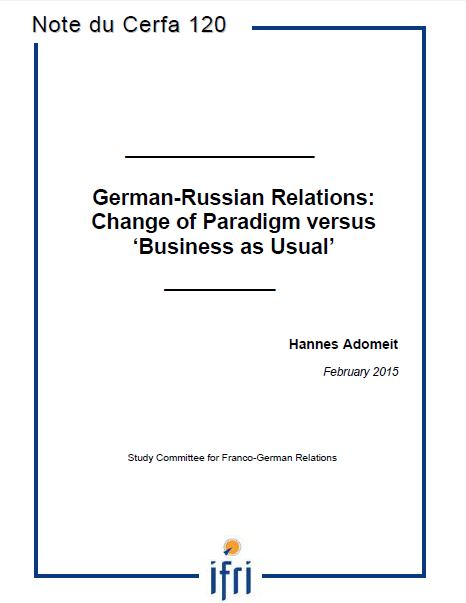German-Russian Relations: Change of Paradigm versus 'Business as Usual'

In 2014, Germany’s relations with Russia markedly deteriorated. The decline was precipitous but it did not occur suddenly. It began some time before Moscow’s annexation of Crimea in March 2014 and the Kremlin’s support for separatism and thinly concealed military intervention in eastern Ukraine.
In the period from the collapse of the Soviet Union in 1992 through Gerhard Schröder’s chancellorship (1998–2005), Germany was Russia’s privileged partner in Europe. In that sense, Berlin had a ‘special relationship’ with Moscow, officially labelled ‘strategic partnership’. Such patterns of the past raise the question whether the current crisis in German-Russian relations is merely a temporary phenomenon, a downturn that will again be replaced almost literally by ‘business as usual’, or if the present deterioration of relations is to be regarded as a change of paradigm that encompasses all dimensions of policy and is likely to persist for the foreseeable future?
This Note du Cerfa attempts to answer this question. In doing so, it will first focus on changes of perception and paradigm on six different levels, that are decisive for the formulation of Germany’s policy vis-à-vis Russia. These include: (1) the effects of Putin’s new domestic and foreign course; (2) the position of the German Green party on the government’s Russia policy; (3) shifts in SPD perceptions of Russia; (4) the consensus of the CDU/CSU-SPD coalition government vis-à-vis Russia; (5) the importance of Russia for German industry and commerce and Germany’s dependency on Russian gas; (6) the public opinion vis-à-vis Russia.
Second, the analysis will look at the conclusions drawn by the German government for the conduct of policy. In this regard it is noteworthy that the policies of the current German government vis-à-vis Russia have, from the very beginning of the coalition’s formation on 17 December 2013, been remarkably firm and consistent. This is quite contrary to previous crises when, as after the Georgian war in August 2008, Berlin quickly returned to ‘business as usual’ in its relations with Moscow. To some extent, the central role that Germany has played in the management of relations with Russia in the crisis over Ukraine can be said to give substance to statements made by President Joachim Gauck, Steinmeier and Defence Minister Ursula von der Leyen at the 50th Munich Security Conference in 2014 that Germany should be more active and should assume greater responsibility in international affairs. There are, however, limits to the deviation from previous patterns of policy, which concern in particular the security and defence dimensions of the crisis.
Consequently, if one posits partnership and cooperation, as well as the ‘Russia first’ approach, to have been the constituent elements of the German paradigm for the relationship, then the paradigm has changed. The new paradigm is that of the management of conflict.
Until 2013, Hannes Adomeit was Professor at the Natolin (Warsaw) campus of the College of Europe, teaching courses on the EU and Russia.

Available in:
Regions and themes
ISBN / ISSN
Share
Download the full analysis
This page contains only a summary of our work. If you would like to have access to all the information from our research on the subject, you can download the full version in PDF format.
German-Russian Relations: Change of Paradigm versus 'Business as Usual'
Related centers and programs
Discover our other research centers and programsFind out more
Discover all our analysesRussia, the Palestinians and Gaza: Adjustments after October 7th
The Soviet Union (USSR), and subsequently the Russian Federation as its internationally recognized legal successor, has consistently sought to play a visible role in efforts to resolve the Israeli-Palestinian conflict.
Deathonomics: The Social, Political, and Economic Costs of War in Russia
The report attempts to outline and examine a truly new phenomenon in Russian society, dubbed “deathonomics”—the making of a mercenary army against the backdrop of the Kremlin’s war in Ukraine, eventually replacing both the Soviet (conscript) and early new Russian (contract) armies. It notes that, by the end of 2023, this trend had turned the military service into one of the highest-paying professions in the country, something not seen in Russia on such a scale since the late 17th century.
Russia's Asia Strategy: Bolstering the Eagle's Eastern Wing
Among Russia’s strategic priorities, Asia traditionally played a secondary role compared to the West. In the mid-1990s, then Foreign Minister Yevgeny Primakov initiated a rapprochement with China and India. Then, in 2014, deteriorating relations between Russia and the West prompted Moscow to begin its “great pivot to the East”.
Kazakhstan After the Double Shock of 2022: Political, Economic and Military Consequences
The year 2022 represented a dual shock for Kazakhstan. In January, the country faced its most severe political crisis since independence, followed in February by Russia’s full-scale invasion of Ukraine, which cast uncertainty over the borders of post-Soviet states. These consecutive crises profoundly shaped Kazakhstan’s domestic and foreign policy.










